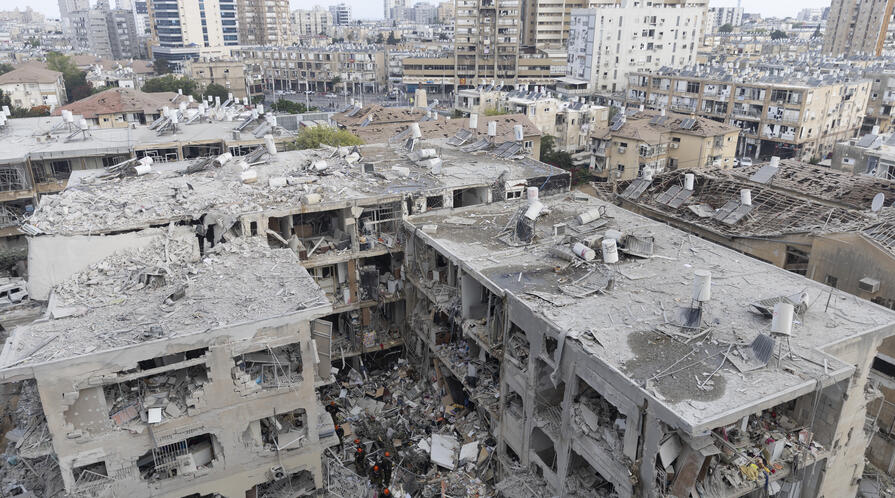Understanding the War between Israel and Iran: Q&A with Amichai Magen and Abbas Milani
Understanding the War between Israel and Iran: Q&A with Amichai Magen and Abbas Milani
Amichai Magen and Abbas Milani explore the geopolitical dynamics and implications of the conflict between Israel and Iran.

As tensions flared between Israel and Iran, the longstanding rivalry between these two nations entered a critical juncture, marked by escalating military confrontations and shifting geopolitical dynamics. This Q&A features insights from Amichai Magen and Abbas Milani, scholars at the Freeman Spogli Institute for International Studies, who analyze the impact of the 12-day war on regional stability and the profound implications for neighboring countries and global powers.
In light of the recent violence, Magen discusses the contours of what he terms the most significant conflict in the Middle East since the 2003 Iraq War, while Milani places this moment within a broader historical context, highlighting the role of domestic sentiments and international alliances. Together, they explore the motivations driving each side, the potential consequences for U.S. involvement, and how domestic political factors may influence future foreign policies in both Israel and Iran, illuminating the complex and evolving landscape of Middle Eastern geopolitics.
How do you assess the war between Israel and Iran in terms of its impact on regional stability in the Middle East? What are the potential implications for neighboring countries and non-state actor involvement?
Amichai Magen: The 2025 Iran-Israel war is the most consequential conflict in the Middle East at least since the 2003 Iraq War and arguably since the Six Day War of June 1967. What makes it so consequential is the fact that the outcomes of the current Iran-Israel War are sure to carry profound geopolitical consequences not only regionally but for the global order. We can understand what is at stake by considering the competing axes that operate in the region and globally. In the region, the last two decades have witnessed the gradual coalescence of two contending axes with radically divergent ontologies and visions for the future of the region: on the one hand, a pro-Western axis composed of Israel and pragmatic Sunni Arab states interested primarily in stability, economic development, and innovation (the "axis of stability"); and, on the other hand, a revisionist, revolutionary "axis of resistance" led by the Islamic Republic of Iran and its network of proxies (Hamas, Hezbollah, Houthis, and various Shi'ia militias in Iraq). These two axes have been in some degree of friction – and sometimes open conflict – with each other long before Iran’s Palestinian proxy Hamas attacked Israel on October 7, 2023. But October 7 triggered the cascade of events that are the proximate cause of the current war. October 7 – dubbed by its architects “the flood” – was meant to unite the fronts of the axis of resistance in a multi-front war whose goal was nothing short of the destruction of Israel. In essence, this led Israel to shift its national strategic doctrine from containment to active dismantlement of the “ring of fire” constructed around it by Iran and its proxies. After dismantling Hamas and Hezbollah, degrading the Houthis and seeing the Assad regime in Syria collapse, Israel has now turned to the "head of the Octopus" – the Ayatollah regime in Iran itself. Israel's declared goals are to dismantle Iran's nuclear and ballistic missile capabilities, which are seen as existential dangers for Israel. An additional, semi-acknowledged goal is to destabilize the Ayatollah regime sufficiently so that the people of Iran topple the regime themselves. If Israel succeeds in achieving those goals – with or without active American participation – we will be living in a new Middle East, one in which the axis of resistance is greatly diminished and the axis of stability greatly empowered. A rapid and convincing Israeli victory may precipitate an internal legitimacy crisis within Iran, hastening the eventual collapse of the Ayatollah regime. What Israel is desperate to avoid is a long war of attrition that would prolong the civilian and economic pain the Jewish State is currently experiencing and allow the Ayatollah regime to recoup and dig in for a prolonged fight. At the global level, a weakened or transformed Iran marks a huge blow to America's adversaries – the "axis of upheaval" composed of China, Iran, North Korea, and Russia. Setting back Iran's nuclear ambitions will also help save the global nuclear non-proliferation system which would effectively collapse if Iran obtains the bomb. If Iran is able to cross the nuclear threshold, numerous countries in Asia, Europe, and potentially beyond will race to obtain nuclear weapons themselves. In the Middle East this will include Egypt, Saudi Arabia, Turkey, and the UAE.
Abbas Milani: For almost forty-five years the Islamic regime and Israel have been fighting an often Cold sometimes kinetic war. Events of the last week are but the massive eruption of this seething volcano. The Islamic regime started the war; Israel started this battle. As for the impact on the region, I think it is in a state of flux. There are too many unknowns. What will the U.S. do? Will the Saudis and other Persian Gulf states bring pressure for an end to the conflict or will an even more desperate Islamic regime in Tehran, faced with the perils of the U.S. entry and even more embarrassing losses, unleash mid-range missiles against U.S. bases, or oil and gas installations of the Persian Gulf states? Will China and Russia continue to sit on the sidelines and suggest "restraint by all sides." As for non-state actors in Lebanon, Iraq, and Yemen, they have hitherto stayed out of the fray. I doubt any of them are in a fighting mode or mood.
In your view, what role should the United States play in addressing the conflict between Israel and Iran? How might U.S. policy decisions influence the balance of power in the region?
Milani: The United States has had a critical role in this relationship hitherto. Some important facts are at least unknown to me. To what extent, if any, was the U.S. coordinating its negotiations with Israel/ The lunatic fringe in the Islamic regime believe they were coordinating from the beginning, and its intent was to lull the regime's vigilance! President Trump’s one-time suggestion that the two sides should fight it out could be construed to mean he had determined that Israel was quickly winning the war, and the U.S. will reap the benefits of a defanged Islamic regime. It could also be construed to mean he meant to stick to his announced policy of no more futile wars in the Middle East. At this moment, I think he is more inclined to help Israel with the destruction of Fordow and gamble that Iran is too frail to expand the war.
Magen: There are rare but critical moments in international relations where the best way to end a war and create the best available prospects for peace is to wage decisive war. This is one of those moments. The policy of the United States now should be threefold: first, help ensure the successful dismantlement of the Ayatollah’s nuclear program, particularly by destroying the heavily fortified Fordow nuclear site. A CNN poll released on June 18 shows 79% of Democrats and 83% of Republicans oppose Iran getting a nuclear weapon. It is hard to think of any issue – domestic or international – where Americans are this united. Second, reduce the suffering on all sides and avoid the risk of a long war of attrition between Iran and Israel by ensuring decisive military victory over the Ayatollah regime. Israel can defeat Iran on its own, but this will take longer, impose greater costs for the region, and carries greater risks of complications such as Chinese or Russian involvement. Decisive American military action will also maximize the prospects of a transition to a new and better Iran and act to strengthen American credibility in other conflicts, including Ukraine and Taiwan. Thirdly, a decisive American intervention will allow the U.S. to lead the day-after diplomacy. This would include offering the Iranian people the real prospect of sanctions relief, investments, and reintegration into an American-led regional system. Regarding Israel, if the U.S. steps in to help defeat Iran now, it will be in a stronger position to bring about a day-after arrangement in Gaza. If the U.S. remains on the sideline, other actors will step in to shape the future of the region.
What are the key domestic political factors within Israel and Iran that are influencing public opinion regarding the conflict? How might these internal dynamics shape each country's foreign policy moving forward?
Milani: I think domestic reactions in Iran will change as the length of the war continues and collateral damage to civilians increases. The announcement by Israel (and for a short while by President Trump) that the entire population of Tehran – estimated to be fourteen million – must leave the city was, I think, probably against international law but certainly caused much anger among some people in Iran. With no polling possible it is hard to gauge how extensive this anger is — an anger that the clerics mine for their expedient purposes. Khamenei’s most recent message – read from a hideout today (June 18) and only his third brief intervention since the beginning of the hostilities – was revealing not in his routine threats but in his effort to suddenly tap into nationalist sentiments. By one account he used the word Iran twenty-two times in a short span. He has all but always dismissed patriotism and nationalism as a Crusader trick but has suddenly become rather “patriotic." As for sentiments in Israel, I defer to my esteemed colleague but only add that by attacking mostly heavily populated cities in Israel, the Iranian regime hopes to increase popular pressure on the Israeli government to end the war.
Magen: The overwhelming majority of Israelis perceive a nuclear-armed Iran as an unacceptable existential risk and view the Ayatollah regime as responsible for constructing a "ring of fire" around Israel meant to destroy it through a never-ending war of attrition. After 20 long months of war against Iran's proxies – Hamas, Hezbollah, Houthis – Israelis are eager to put an end to the war by going after Iran itself. Unsurprisingly, public opinion in Israel strongly supports the war. In a poll published today by the Israel Democracy Institute, for example, 80% of all Israelis (Arabs and Jews) support Israel's attack on the Islamic Republic. Among Israel's majority Jewish population 92% support the war. This marks a far-higher degree of support for war against Iran than for the war against Hamas in Gaza. In terms of domestic politics, Israel's Prime Minister, Benjamin Netanyahu, has taken an enormous (and uncharacteristically bold) gamble on a rapid and decisive victory over the Ayatollah regime. It is too early to say whether this gamble will pay off politically for Netanyahu. Under one scenario, if successful, Netanyahu's political fortunes would improve dramatically. He would have effectively reframed the October 7th debacle and secured his legacy as the prime minister who saved Israel from existential danger. But there is an alternative scenario. Ironically, Netanyahu may face a Churchillian fate whereby he loses the immediate post-war elections. Like the British in July 1945, after having won the war, the majority of war-weary Israelis would want change, and elect someone else as prime minister. On the other hand, if the Iran-Israel War drags on without a decisive outcome, levels of Israeli public support for the war, and for Netanyahu, are expected to diminish over time.
How do you see the conflict affecting international alliances, particularly between Israel, Iran, and other global powers? Which countries might be most affected, and how could this reshape diplomatic relationships?
Magen: A decisive Israeli victory will disrupt the anti-Western China-Iran-North Korea-Russia revisionist axis and revitalize Western influence globally. The dismantling of Iran's nuclear weapons program will reduce the risk that countries in the region - notably Bahrain, Egypt, Saudi Arabia, Turkey, and the UAE - will seek to acquire nuclear deterrence to protect themselves against Iran. At the same time, the effective dismantlement of the Iran-led "axis of chaos" will encourage large-scale investment in the region and create new opportunities for regional cooperation based on the existing Abraham Accords. In the event that the Ayatollah regime collapses and a more pro-Western Iran emerges, Israel and Iran could quickly turn from mortal enemies into close allies. Israelis and Iranians are natural friends and allies in the Middle East.
Milani: The clerical regime based its long-term survival on proxies for regional muscle, and on China and Russia for international support, cover, or a veto. The regime tried to join as junior members the new "International of Authoritarianism" led by China. Iran offered China and Russia remarkably sweet deals to entice them into stronger security agreements. All indications are that both China and Russia see the regime as not a viable long-term ally. They both have signed giant economic and political deals with countries like Saudi Arabia and the United Arab Emirates.
Considering the historical context and current tensions, what are the long-term geopolitical ramifications if the conflict continues? What strategic options do both Israel and Iran have that could influence regional security in the coming years?
Milani: I have long argued that Iran's nuclear problem can only have a political solution: the establishment of a democratic secular government. The clerical despotism is surely at its weakest historic moment now. Prudent policy by outside forces can hamper or help this process.
Magen: The current war obfuscates the core affinities that existed historically between Persians and Jews and that could readily flower if and when Iran frees itself from the Ayatollah regime. Since Jews and Iranians (Persians, Azeris, Kurds and others) are all minorities in the Middle East, I can foresee an alliance of minorities among them. I would not be at all surprised if over the coming decade we could be talking not only about the expansion of the Abraham Accords, but of Iranian-Israeli reconciliation and peace.
FURTHER READING
A Nuclear Energy Program that Benefits the Iranian People
by Siegfried Hecker, Abbas Milani, January 21, 2014
Bulletin of the Atomic Scientists
Only Democracy Can End Iran's Nuclear Threat
by Abbas Milani, June 18, 2025
Project Syndicate





